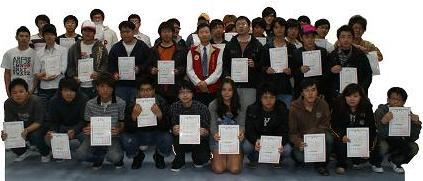About Us
Department of Computer Science & Information Engineering
| Tel: | 02-28927154 #8031, #8032 |  |
| Fax: | 02-28960674 | |
| E-Mail: | q8030@tpcu.edu.tw |
Educational Objectives
Currently, the worldwide development of various scientific technologies is progressing at an ever-increasing rate. It is noteworthy that computer and information technology plays a crucial role in both the defense industry and the manufacturing industry; hence, computer science and information technology is one of the priority high-tech feature of almost every developed country. Our country relies primary on exports, which indicates that export-enhancement should be the theme of the national economic. Among our various exported products, the products with the most potential and valued-added are computer-related. No other industry can aspire to promote its manufacturing yield and enhance the competitive capability of its products without upgrading computer technology.
Consequently, the established objective of our department is to train highly qualified students, possessing both theoretical knowledge and practical experiences in design and associated applications in computer software and hardware and communication systems. Our department has already made significant contributions in educating students for future jobs in the computer-related industry of our country. We are still expanding our efforts to promote the modernization of the computer-related industry, establish our reputation, and enhance the competitive capability of Taiwan's industry.
Characteristics of Development
In order to train prospective students to be highly qualified computer-related technicians, our department stresses four major directions in teaching and research:
A. The design and associated applications of computer systems: software and hardware for microprocessors, computer networks, multimedia networks, image processing.
B. Microcomputer control: mini/microprocessor control systems, single-chip control system.
C. The design and associated applications for communications: analog/digital communication, digital signal processing, cable/wireless communication systems, cable/wireless network engineering.
D. The design and measurement of Very Large Scale Integrated (VLSI) Circuits: the theories and design of VLSI, and CAD, design of electronic circuits in CPLD, and FPGA, fabrication and layout of printed circuit board (PCB), the measurement of properties of VLSI and semiconductor devices.
Future Directions
There are four priorities for our department in teaching and research development.
A. Aggressively educate prospective students to be professional computer engineering technicians in the areas of hardware interface of microprocessors, computer algorithms and networks, software and hardware design for commercial and industrial application.
B. Aggressively educate prospective students to be professional telecommunications technicians in the areas of communications systems digital signal processing, and cable/wireless network communications.
C. Aggressively educate prospective students to be professional VLSI technicians in the areas of the theories and design of VLSI electronic circuits computer CAD, design of electronic circuits in CPLD, and FPGA, the layout and fabrication of PCB, the measurement of properties of VLSI and semiconductor devices.
D. Continuously promote various license certification examinations and utilize current equipment and facilities to follow national license certification rules. Promote grade B and C license qualifying examinations for technicians in installation and maintenance of digital electronics and computer software/hardware, to enable our students to possess both professional knowledge and perceptive techniques.